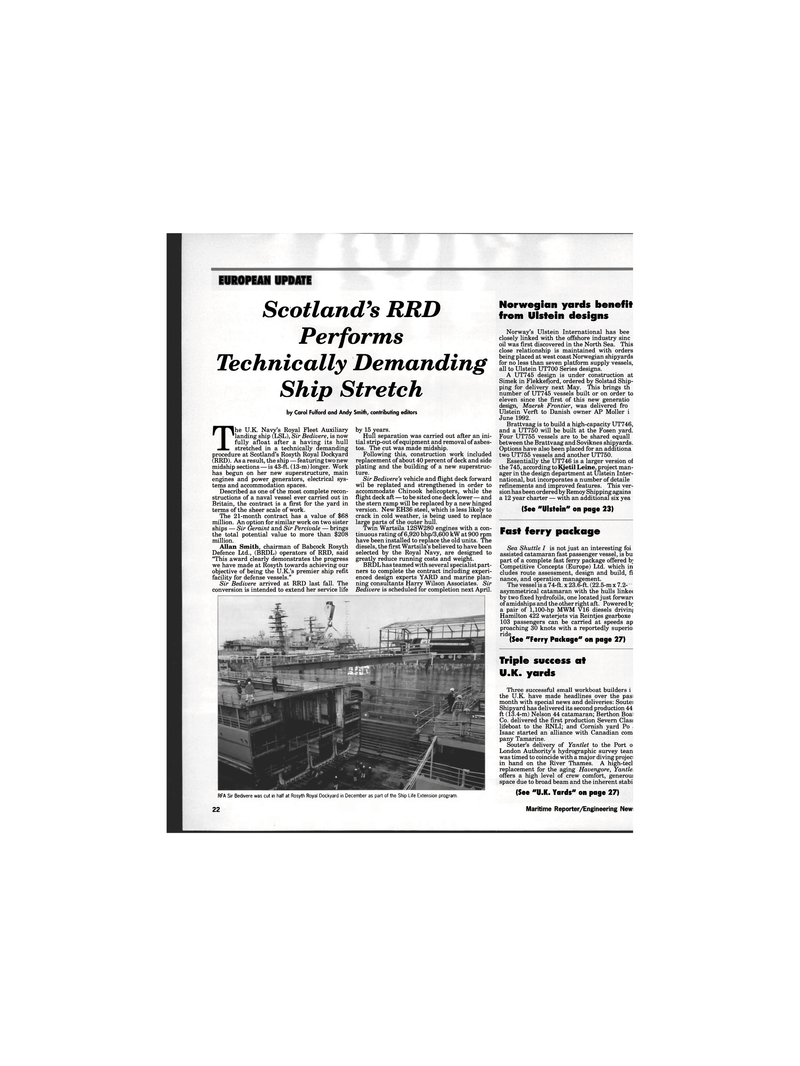
Page 20: of Maritime Reporter Magazine (July 1995)
Read this page in Pdf, Flash or Html5 edition of July 1995 Maritime Reporter Magazine
EUROPEAN UPDATE
Scotland's RRD
Performs
Technically Demanding
Ship Stretch by Carol Fulford and Andy Smith, contributing editors
The U.K. Navy's Royal Fleet Auxiliary landing ship (LSL), Sir Bedivere, is now fully afloat after a having its hull stretched in a technically demanding procedure at Scotland's Rosyth Royal Dockyard (RRD). As a result, the ship — featuring two new midship sections — is 43-ft. (13-m) longer. Work has begun on her new superstructure, main engines and power generators, electrical sys- tems and accommodation spaces.
Described as one of the most complete recon- structions of a naval vessel ever carried out in
Britain, the contract is a first for the yard in terms of the sheer scale of work.
The 21-month contract has a value of $68 million. An option for similar work on two sister ships — Sir Geraint and Sir Percivale — brings the total potential value to more than $208 million.
Allan Smith, chairman of Babcock Rosyth
Defence Ltd., (BRDL) operators of RRD, said "This award clearly demonstrates the progress we have made at Rosyth towards achieving our objective of being the UK's premier ship refit facility for defense vessels."
Sir Bedivere arrived at RRD last fall. The conversion is intended to extend her service life by 15 years.
Hull separation was carried out after an ini- tial strip-out of equipment and removal of asbes- tos. The cut was made midship.
Following this, construction work included replacement of about 40 percent of deck and side plating and the building of a new superstruc- ture.
Sir Bedivere's vehicle and flight deck forward wil be replated and strengthened in order to accommodate Chinook helicopters, while the flight deck aft — to be sited one deck lower—and the stern ramp will be replaced by a new hinged version. New EH36 steel, which is less likely to crack in cold weather, is being used to replace large parts of the outer hull.
Twin Wartsila 12SW280 engines with a con- tinuous rating of 6,920 bhp/3,600 kW at 900 rpm have been installed to replace the old units. The diesels, the first Wartsila's believed to have been selected by the Royal Navy, are designed to greatly reduce running costs and weight.
BRDL has teamed with several specialist part- ners to complete the contract including experi- enced design experts YARD and marine plan- ning consultants Harry Wilson Associates. Sir
Bedivere is scheduled for completion next April.
Norwegian yards benefit from Ulstein designs
Norway's Ulstein International has been closely linked with the offshore industry since oil was first discovered in the North Sea. This close relationship is maintained with orders being placed at west coast Norwegian shipyards for no less than seven platform supply vessels, all to Ulstein UT700 Series designs.
A UT745 design is under construction at
Simek in Flekkefjord, ordered by Solstad Ship- ping for delivery next May. This brings the number of UT745 vessels built or on order to eleven since the first of this new generation design, Maersk Frontier, was delivered from
Ulstein Verft to Danish owner AP Moller in
June 1992.
Brattvaag is to build a high-capacity UT746, and a UT750 will be built at the Fosen yard.
Four UT755 vessels are to be shared equally between the Brattvaag and Soviknes shipyards.
Options have also been placed for an additional two UT755 vessels and another UT750.
Essentially the UT746 is a larger version of the 745, according toKjetil Leine, project man- ager in the design department at Ulstein Inter- national, but incorporates a number of detailed refinements and improved features. This ver- sion has been ordered by Remoy Shipping against a 12 year charter — with an additional six year (See "Ulstein" on page 23)
Fast ferry package
Sea Shuttle I is not just an interesting foil assisted catamaran fast passenger vessel, is bu part of a complete fast ferry package offered b;
Competitive Concepts (Europe) Ltd. which in eludes route assessment, design and build, fi nance, and operation management.
The vessel is a 74-ft. x 23.6-ft. (22.5-m x 7.2-m asymmetrical catamaran with the hulls linke( by two fixed hydrofoils, one located just forwar< of amidships and the other right aft. Powered b1 a pair of 1,100-hp MWM V16 diesels driving
Hamilton 422 waterjets via Reintjes gearboxes 103 passengers can be carried at speeds ap proaching 30 knots with a reportedly superio: ride (See "Ferry Package" on page 27)
Triple success at
U.K. yards
Three successful small workboat builders ir the U.K. have made headlines over the pasi month with special news and deliveries: Soutei
Shipyard has delivered its second production 44 ft (13.4-m) Nelson 44 catamaran; Berthon Boai
Co. delivered the first production Severn Class lifeboat to the RNLI; and Cornish yard Pon
Isaac started an alliance with Canadian com pany Tamarine.
Souter's delivery of Yantlet to the Port o
London Authority's hydrographic survey tean was timed to coincide with a major diving projeci in hand on the River Thames. A high-teel replacement for the aging Havengore, Yantle, offers a high level of crew comfort, generous space due to broad beam and the inherent stabi (See "U.K. Yards" on page 27) RFA Sir Bedivere was cut in half at Rosyth Royal Dockyard in December as part of the Ship Life Extension program.
H fSK?" iLeiiffi 22 Maritime Reporter/Engineering New;

 19
19

 21
21
